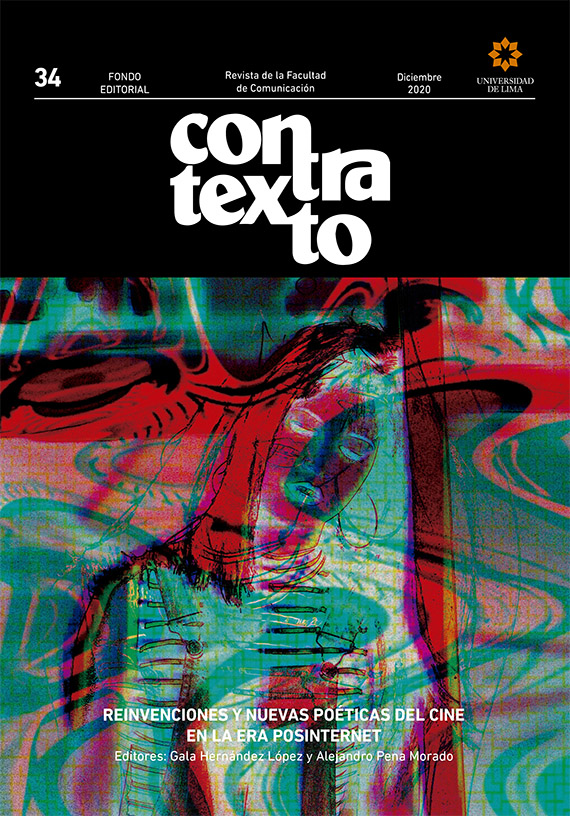Spectropolitic: image and hauntology in the contemporary visual culture
DOI:
https://doi.org/10.26439/contratexto2020.n034.4871Keywords:
film, visual culture, tele-technology, techno-tele-discursivity, spectropoliticsAbstract
In his book Spectres of Marx, Jacques Derrida puts forth the term hauntology [hantologie] as an epistemic turn dedicated to thinking about the ways in which technology materialises memory that stems from the premise that nothing enjoys a purely positive existence, and that, as music critic Mark Fisher reminds us in his reflections on depression, everything that exists is possible only on the basis of a series of absences that precede it, surround it, and allow it to possess coherence and intelligibility. This article presents the concept of spectropolitics in order to observe how certain events of late capitalism and financial abstractions reverberate in the collective psyche and transform into spectral apparitions. Far from an understanding of the obscurantist spectre as something real, we understand its presence as a sign or a metaphor of the vision that acts as a clarifying figure with a specifically ethical and political potential. Likewise, the new materialities of the fleeting, fugitive and subjective visuality of our present (dominated by the internet and the processes of psychic privatisation) interrogate us about the collectivities that are organised in the ways of seeing of contemporary societies and in the traces of the power structures that underlie them.
Downloads
References
Antonioni, M. (Director). (1966). Blow-Up (Deseo de una mañana de verano). [Film Color - 1.85:1]. Bridge Films, Metro-Goldwyn-Mayer (MGM)
Arendt, H. (2006). Los orígenes del totalitarismo. Alianza Editorial.
Barthes, R. (2014). El susurro del lenguaje, más allá de la palabra y la escritura. Paidós.
Berardi, F. (2019). Futurabilidad. La era de la impotencia y el horizonte de la posibilidad. Buenos Aires: Caja Negra.
Beyeler, T., Gisbert, P. & Nogueira, R. R. (22 de febrero de 2018). El Conde de Torrefiel: “La libertad de expresión lo abarca todo” [Mensaje en un blog]. http://www.fuga.es/2018/02/22/el-conde-de-torrefiel-la-libertad-de-expresion-lo-abarca-todo/
Cerezo, A. (Directora). (2018). Fragments. Fragments [Single-channel video]. Disponible en: http://azaharacerezo.com/fragments.html
Derrida, J. (1995). Espectros de Marx. El estado de la deuda, el trabajo del duelo y la nueva internacional. Trotta.
Derrida, J. (2005). Canallas. Dos ensayos sobre la razón. Trotta.
Espai en Blanc (4 de abril de 2019). El pressentiment No.88 [mensaje en un blog]. http://elpressentiment.net/no-88
Fisher, M. (2018). Los fantasmas de mi vida. Escritos sobre depresión, hauntología y futuros perdidos. Caja Negra.
Fisher, M. (2016). Realismo capitalista. ¿No hay alternativa?. Caja Negra.
Fisher, M. & Aguirre, P. (7 de agosto de 2016). Hay que democratizar la política y el trabajo. 88 [Mensaje en un blog]. https://elestadomental.com/diario/hay-que-democratizar-la-politica-y-el-trabajo
Garcés, M. (2009). Visión periférica. Ojos para un mundo común. En A. Buitrago (Ed.), Arquitecturas de la mirada (pp. 77-96). Cuerpo de Letra.
Garcés, M. (2010). Anonimato y subjetividad. Una lectura de Merleau-Ponty. Daimon Revista Internacional De Filosofia, (44), 133-142. https://revistas.um.es/daimon/article/view/96441
Garcés, M. (2017). Nueva ilustración radical. Anagrama.
Gisbert, P. (2017). Mierda bonita. Escritos para el Conde de Torrefiel. La uÑa RoTa.
Gordon, A. & Radway, J. (1997). Ghostly Matters: Haunting and the Sociological Imagination. University of Minnesota Press.
Marzo, J. L. (2017). Los fantasmas adelantan el reloj. En J. L. Marzo (Ed.), Espectres (pp.129-200). La Virreina Centre de la Imatge.
Llevadot, L. (2018). Jacques Derrida: Democràcia i sobirania. Editorial Gedisa.
Rosenberg, M.; Conferssore, N. & Cadwalladr, C. (20 de marzo de 2018). La empresa que explotó millones de datos de usuarios de Facebook [Mensaje en un blog]. https://www.nytimes.com/es/2018/03/20/espanol/cambridge-analytica-facebook.html
Schröder, R., & Metahaven (Directores). (2018). Possessed [video film]. Dutch Mountain Film.
Srnicek, N. (2018). Capitalismo de plataformas. Caja Negra.
Steyerl, H. (2018). Arte Duty Free. El arte en la era de la guerra civil planetaria. Caja Negra.
Stiegler, B (2019). Cinematic Time and The Question of Malaise. En Kul-Want, Ch. (Ed.), Philosophers on film from Bergson to Badiou: a critical reader. (pp. 8-26). Columbia University Press.
Pereen, E. (2014). The Spectral Mathaphor. Living Ghosts and the Agency of Invisibility. Palgrave Macmillan.
López Petit, S. (23 de abril, 2020). El coronavirus com a tetare de la veritat. https://www.elcritic.cat/opinio/santiago-lopez-petit/el-coronavirus-com-a-teatre-de-la-veritat-55248
Zemos98 (Productora). (2014). Entrevista a Abu Ali. Remapping Europe [archivo de video]. https://vimeo.com/95162089
Downloads
Published
Issue
Section
License
All of the works published are licensed under a CC BY 4.0 Creative Commons Attribution license. (updated on March 1st 2021)
The content of the journal may be shared in any material or format. The content may be adapted, contributed upon and transformed. Both possibilities are only permitted in so far as they complete the following conditions:
- Attribution: Credit must be given where it is due, a link to the license must be provided and changes, if made, must be indicated. This should be done in the manner deemed appropriate, without suggesting that the licensor promotes you or your use of the material.
Ownership rights
The patrimonial rights for Contratexto are published under a Creative Commons BY 4.0 license, allowing authors to keep the patrimonial rights to their work without restrictions.
If a work published in Contratexto were to be copied, distributed, spread, or any other activities contemplated in the aforementioned license, the author(s) and the journal must be mentioned visibly and expressly.
Self-archive
This journal allows and encourages authors to post items submitted to the journal on personal websites or institutional repositories both prior to and after publication, while providing bibliographic details that credit, if applicable, its publication in this journal.

















